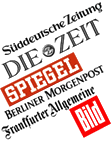The annual International Exhibition for the Food, Agriculture and Horticulture Industries took place this week in Berlin, and according to Der Tagesspiegel, the candidate countries for membership in the European Union used the event to showcase their readiness for the EU. In an article on 22 January entitled "Folklore, Beer and the Liqueur 'Stalin's Tears,'" Jörg-Peter Rau drew attention to the attempts of the countries of Central and Eastern Europe to show that they are prepared to enter the European Union.
No more "kompot"
"Gone are the days in which grey foreign ministry bureaucrats offered unsightly preserves [kompot in Czech] and dubious spirits," the article reads. Present this year are Poland, Hungary, the Czech Republic, Slovakia, Estonia and Hungary, among others. Each is presenting their own special brands of sausage, cheese, beer and liqueur. Allegedly, the origins of "Stalin's Tears" lie in the Czech Republic. One wonders when a corresponding array of similarly inappropriate beverages drawing on the names of famous dictators will appear: "Hitler's Sorrows" or "Sighs of Ceausescu" come to mind.
The article points out that while competition with the West is great, there is also a fair amount of competition among the candidate countries themselves, as underlined by the Hungarian president of the Agrarian Marketing Centre. According to the president of the Estonian Chamber of Trade and Agriculture, Ester Tuiksoo, these countries also consider the trade fair an opportunity to test the German market.
CDU loves enlargement
As the candidate countries were presenting their culinary specialties, the German press reported this week that the Christian Democratic Union (CDU) has completed a detailed ten-point paper clarifying their position on EU enlargement. "CDU Makes Its Position Known on EU Enlargement" reads the headline in Die Welt of 23 January. The paper was prepared by Martina Krogmann, one of the party's Bundestag representatives, and by its European expert Reinhard Stuth.
The paper is overwhelmingly positive regarding the effects of enlargement on Germany. First, internal security will be increased; second, the external border of the EU will extend another 750 km into the east; and finally, the market will grow. In this particular report, the CDU is critical of "the exaggeration of fears" of a possible dramatic increase in immigration to Germany. The report is further critical of the present government, which, claims the CDU, is not educating Germans living in the border regions about the realities of enlargement.
An island in an EU sea
An article by Mariele Schulze Berndt on 25 January in Der Tagesspiegel presents a different angle on EU enlargement. Similar to the FAZ article of 16 January, "Between a Regional Search for Identity and Enlargement," (see last week's installment of this column: Germany's Fears), this article discusses the implications of enlargement for the regions that will not be included—in this case the Russian enclave of Kaliningrad.
EU Commissioner for External Relations Chris Patten visited Moscow this past week to discuss the issue. The article reports that Patten is reluctant to grant Kaliningrad the status of associated member of the European Union. The EU is worried, alleges the article, "that Kaliningrad is developing only very slowly from a purely military ground into a region with civil structures." The Russian Baltic fleet is still stationed there; the crime level is very high; and environmental, drug and health problems abound.
It is for this reason that the EU thinks that the borders of Poland and Lithuania should be protected. But Moscow is against the idea that Russians should need visas to travel to Kaliningrad.
The patriarch says no to drugs
It is not only in Kaliningrad that drug problems exist according to an article in Frankfurter Allgemeine on 23 January. In a piece entitled "Opium against the People," the author, Elfie Siegl, points out that the situation has become so acute as to arouse the concern of the Russian patriarch, who "normally distances himself in word and action from social engagement."

|
It is an article which highlights the more depressing features of drug abuse in Russia, with children as young as seven abusing drugs, and others entering service in the armed forces already addicted. While this is not a new problem, it is certainly worth bringing to light the fact that Patriarch Alexij has commented on it and led a two-day conference on the subject. The other interesting point of the article would appear to be that the leading spiritual force in Russia today does not normally deem it appropriate to comment on social, which are also largely spiritual, issues.
Besides the ongoing debate regarding enlargement of the European Union, Russia got the most press in Germany this week. Along with the above, other articles included two in Die Tageszeitung on the powerlessness of the European Council with regards to Chechnya: not only does the Council have little power, but it is displaying its lack of power openly, according to Klaus-Helge Donath's interview with human rights activist Oleg Orlow.
Last and maybe least
Finally, Die Tageszeitung also ran an article called "In Ukraine, the Heads Are Rolling," by writer Barbara Örtel, about the firing of Julia Tymoschenko, deputy prime minister to President Leonid Kuchma. The article was published on 24 January but commented on an event that occurred on 15 January. Better late than never in the German press with regards to Central and Eastern Europe.
Andrea Mrozek, 26 January 2001
Moving on:
- Archive of German press reviews
- Browse through the CER eBookstore for electronic books
- Buy English-language books on Germany through CER
- Return to CER front page
Sources:
Frankfurter Allgemeine Zeitung
Die Welt
Die Tagesspiegel
Die Tageszeitung




